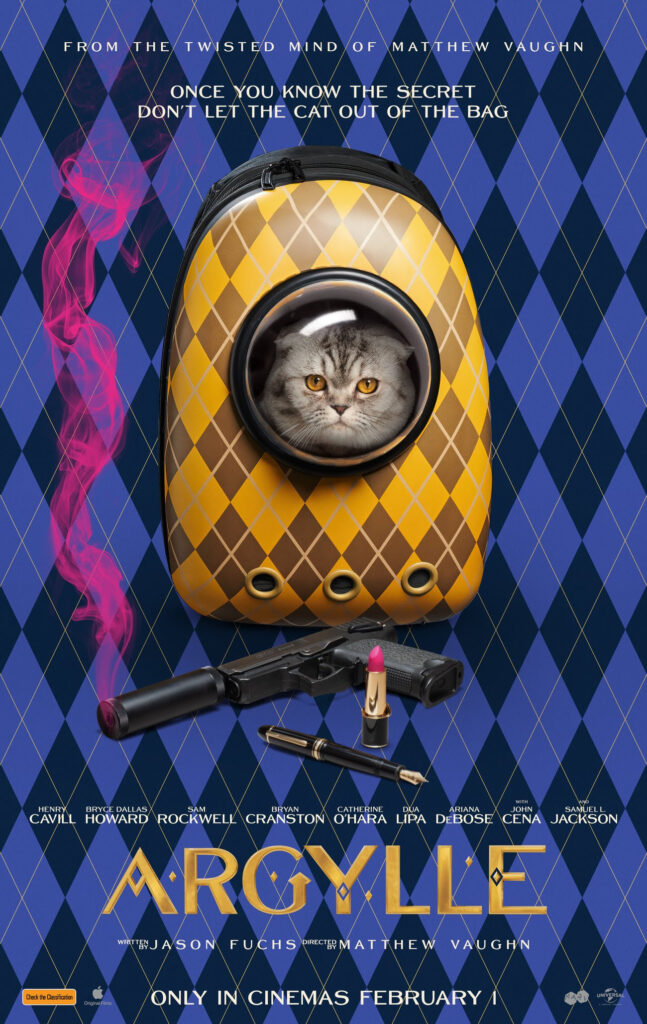Henry Cavill has not had much luck as the face of franchises. Between non-starters like The Man From U.N.C.L.E., re-cast leads like The Witcher, and whatever trainwreck the DCEU has ended up with, there was a time when the man didn’t have a franchise to his name. This all changes in 2024, with Matthew Vaughn’s (The King’s Man) new flagship, Argylle. Cavill plays the titular hero, he’s front and centre on the poster, and … he’s barely in the movie. There’s a marginally different movie behind this artifice, but it’s one that you’ve already seen before. There’s barely a mind here, let alone a twisted one.
Elly Conway (Bryce Dallas Howard, Jurassic World Dominion) is an anxious author of spy novels. When her books hew suspiciously close to the truth, she attracts the attention of the international spy community. Only rogue agent Aidan (Sam Rockwell, See How They Run) stands between Elly and the forces that Division director Ritter (Bryan Cranston, Asteroid City) throws at her to bring her in. But why does she see so much of Argylle (Cavill, TV’s The Witcher), her creation, in Aidan, and why does Argylle talk to her when she sees him in the mirror?
How many times have you seen a retired gentleman-of-action based out of a French vineyard in the last five or so years? Here’s another one to add to your collection. Universal has politely asked audiences not to “let the cat out of the bag” about Jason Fuch’s (I Still See You) script, and that’s easy enough to do: you really don’t have to go far to have seen a variant of this before. The only real surprise in Argylle is that it’s a movie released in 2024 that still hinges on a flash drive as its McGuffin.
Despite spearheading the Argylle property as part of a new way forward for Marv Studios, Vaughn brings an often near workmanlike air to proceedings. The film opens with a heavily stylised jaunt in Greece, with a car chase that looks good but ultimately has no weight because none of the characters involved ever matter. The train melee that introduces Aidan would be better if it weren’t so psychotically edited (a deliberate stylistic choice), and wasn’t so reminiscent of other recent train action movies; a climactic battle is supposed to be balletic but is shot in a remarkably plastic way. These are the good sequences: Argylle offers an almost criminally dull vision of London. There’s also a cat in this movie, who Fuchs remembers when he needs to serve story purposes, or to be a cattus ex machina — and it’s a breed that’s illegal in several countries.
This is not a movie to delight, but there is a degree of warmth to Argylle. Why you’d want to obscure the fact that this is a buddy movie between Howard and Rockwell is the real mystery, as they have a legitimate chemistry and this is the sort of effortless role that Rockwell thrives in. Howard is rarely given a chance to carry a movie, and she takes the weight of Argylle on her shoulders. If any of this works, it’s thanks to her and Rockwell. Cranston’s villainy is one note, which is unusual for Vaughn’s career of grandiose orators, and Samuel L. Jackson (The Marvels) basically got a trip to France out of the film.
There are other other curious choices, like building a film around the motif of the “lost” Beatles song “Now and Then”, and drowning out multiple sequences with indistinct and generic disco music. There’s no real logic to how the Division works, or what the (very real) CIA are supposed to be doing while any of this story is going down, or what the Master File is supposed to reveal. Vaughn may be an EP, but this is the first of his films in a long time that he doesn’t have a screenplay credit on; his movies are often vulgar, but they normally at the very least have more sense than this.
Argylle optimistically ends with the promise of a movie version of the first ever Argyllestory, which was told in the not-very-good book. It’s set twenty years before the modern Argylle stories and does not feature Cavill. Our man loses again.
There is a lot of bluster behind the manufacture and promotion of Argylle for what amounts to a relatively basic action movie with espionage elements. Howard and Rockwell are the film’s true draw cards, and they make for a charismatic pairing, but Argylle is almost literally all smoke and mirrors.

